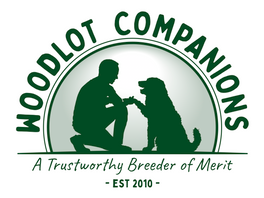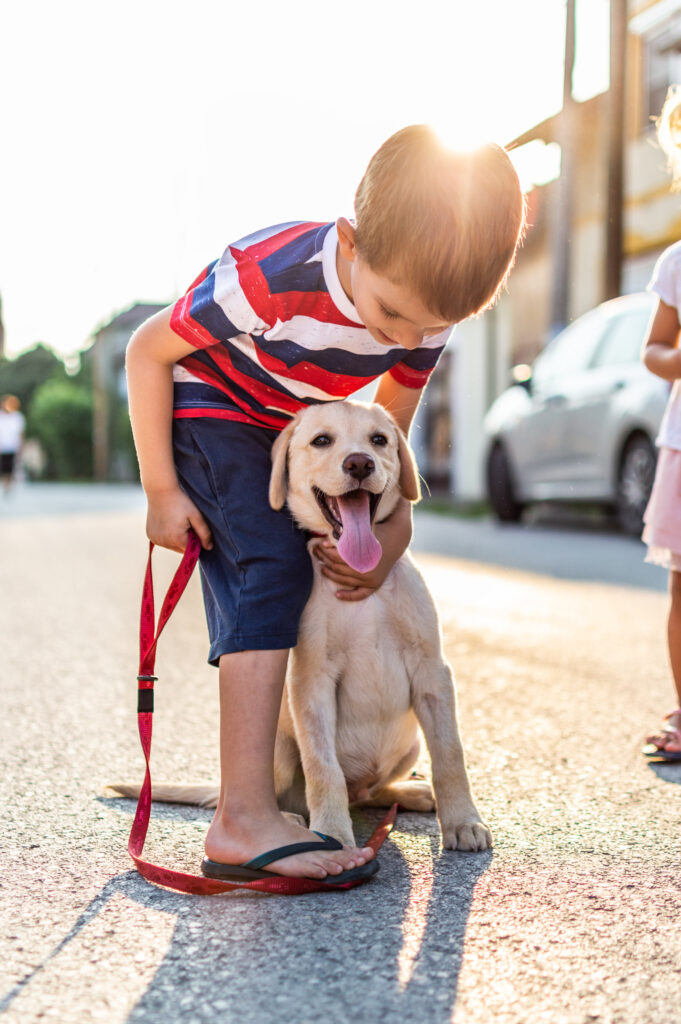Training a puppy is a big task that requires the whole family to participate and with kids on summer break, they can be a big help! You may just find both your kids and pup growing up together.
Is Growing Up with a Dog Good for Kids?
Yes! Kids often have an innate gift when it comes to training puppies. With their endless patience, boundless energy, and natural empathy, children make exceptional trainers for these furry bundles of joy. Moreover, kids have a natural knack for turning training sessions into fun-filled adventures. They approach each interaction with a sense of enthusiasm and creativity, infusing the process with playfulness and joy.
Whether it’s teaching a puppy to sit, stay, or fetch, they find innovative ways to make learning enjoyable for both parties involved. Together, they embark on a journey of growth and discovery, learning from each other every step of the way.
What Are the Advantages of Growing Up with Dogs?
Although summer is known to be full of lazy days, giving your child a companion to spend their days with and help take care of can have some great benefits. Kids who grow up with dogs are shown to have higher self-esteem, compassion, and a sense of responsibility.
Responsibility
As we know responsibility never takes a vacation! Taking care of a pet is different than the everyday chores of the household such as unloading the dishwasher or folding laundry. Being responsible for the well-being of an animal by taking on tasks such as feeding, walking, and bathing has been shown to give your child a boost in their confidence. Accomplishing these small tasks can help them feel competent and give them a sense of accomplishment. As your child learns the care of a puppy and how they evolve as the pup grows- they will have a head start on understanding how to manage the day-to-day tasks they will face as they grow up.
Health
Recent studies in pediatric health concluded kids who lived with dogs during their first year of life had stronger immune systems than those who did not. They reasoned that exposure to dogs was probably the cause of a boost in the maturation of their immune systems. When they did happen to get sick a shorter round of antibiotics was necessary compared to children without pets.
Additionally, kids who had at least one parent who suffered from respiratory allergies or asthma were less likely to develop allergies themselves when they had a dog in the house. It should be noted that early exposure is key as children who had a dog after their first year showed no added health benefits. However, Kids who did not have dogs in the home were four times more likely to develop eczema than those who did.
Emotional Intelligence
Caring for another and learning compassion can lead to a better sense or understanding, not just our effects on animals, but the humans in our lives as well. When a child must choose between playing video games or going outside to take care of the puppy it’s a practice of being selfless. Maybe they won’t do it right away and maybe they will need encouragement, but having a dog has shown to be an invaluable tool for helping children understand empathy.
Play and Excersize
Studies have shown that kids who have a puppy to play with exercise an average of 11 minutes more per day. That may not seem like a lot, but it adds up to 5.5 hours a month and 66 hours a year! With increased time out in the sunshine with man’s best friend, it’s no wonder that kids with dogs have also been shown to have reduced anxiety and stress levels. Playing with a pup is fun and this releases oxytocin, dopamine, and cortisol making dogs + kids = HAPPINESS!
How Old Should My Children Be Before We Bring a Puppy Home?
There are benefits at every stage of childhood when it comes to dogs, but since there are safety factors involved, we encourage you to think about your children and what benefits you hope to encourage. For example, if you bring home a puppy during the toddler years, you could end up potty training both your child and pup at the same time! Puppies can be great partners in teaching young kids how to be gentle, but it may not be the best route. Puppies are known to nip at and bite kids especially, so you may want to wait until your kids have gained some understanding of this concept beforehand.
No matter when you choose to though kids and puppies have always proven again and again that the benefits of growing up together far outweigh the negatives.
As a family, young and old alike should be given an equal share in taking care of your new puppy, even kids as young as three can help feed and water the dog. Older kids can be given tasks appropriate for their age. Just remember it is helpful when everyone uses the same words or phrases when giving commands. Don’t discount the importance of body language, tone of voice, and positive reinforcement. Through gentle gestures and encouraging praise, you can convey your expectations to your canine companions in a way that fosters understanding and cooperation. Your furry family member is learning your language in all its forms and kids have a knack for learning theirs!
If you are interested in learning more about what puppy breed is the right fit for you, the benefits of growing up with dogs, or would like to chat with Kimberly our local Puppy Trainer before selecting your puppy, please don’t hesitate to contact us!



